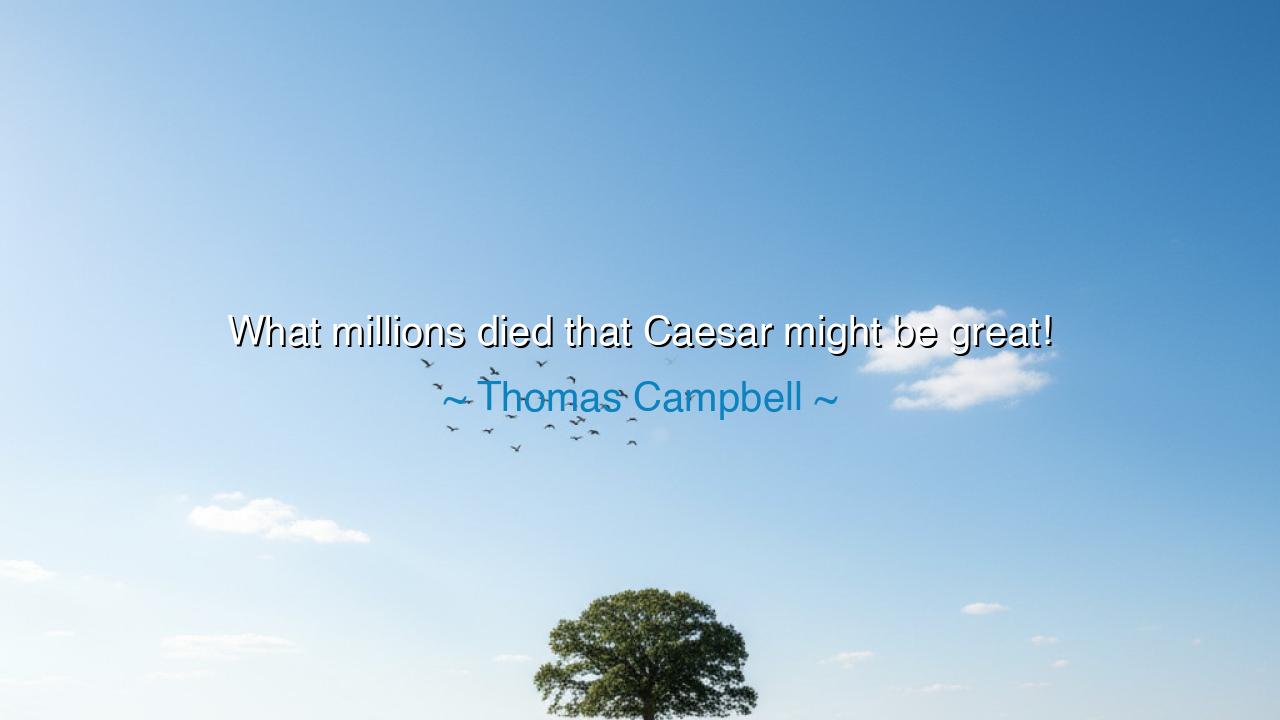
What millions died that Caesar might be great!






In this piercing lament, the poet Thomas Campbell cries out not in admiration, but in mourning: “What millions died that Caesar might be great!” These words, simple yet thunderous, echo across the corridors of time as both judgment and warning. Campbell, with the voice of a moral prophet, strips away the glory that history drapes upon conquerors, revealing beneath it the suffering of the forgotten multitudes. He reminds us that the crowns of the mighty are often forged from the bones of the innocent, and that greatness built upon blood is a monument to vanity, not virtue.
The meaning of this quote lies in its rebuke of false greatness — the kind that glorifies power at the cost of human life. Julius Caesar, the symbol of empire and conquest, rose to fame as Rome’s most celebrated general and ruler. His name became synonymous with authority and ambition. Yet Campbell asks us to look not at Caesar’s laurels, but at the price of his triumphs. Every victory that lifted him higher was purchased with the death of thousands, perhaps millions — soldiers who fell nameless on foreign fields, civilians crushed beneath the heel of war, nations erased from the earth. The poet’s question is not one of history, but of conscience: Can greatness be great if it demands the sacrifice of so many lives?
The origin of this line can be traced to Campbell’s poem “The Pleasures of Hope” (1799), written in an age when Europe was torn by revolution and empire. Napoleon Bonaparte, the new Caesar of his time, was reshaping the continent through conquest and bloodshed. Campbell saw in Napoleon the repetition of Rome’s ancient tragedy — the same hunger for glory, the same disregard for the human cost. His verse was a warning to future generations: that mankind’s fascination with conquest blinds it to the silent suffering beneath the banners of victory. Thus, the poet’s voice transcends its age; it speaks to every century in which power rises on the shoulders of the slain.
Consider the march of Alexander the Great, whose empire stretched across continents, leaving in its wake both splendor and ruin. His name endures in history as one of the greatest conquerors, yet behind his glory lay cities burned, families shattered, and cultures erased. What millions perished so that one man might be called “Great”? The question Campbell poses to Caesar could be asked of every emperor, every tyrant, every warlord who sought immortality through domination. For all their victories, none could conquer time — their empires crumbled, their statues fell, and only the grief of the countless remained eternal.
But Campbell’s cry is not only for the past — it is a mirror held up to the present. In every age, men and women rise who seek greatness through ambition untempered by compassion — politicians who destroy for power, corporations that exploit for gain, leaders who sacrifice the many for the glory of the few. The poet’s lament reminds us that true greatness is not measured by conquest, but by the lives one uplifts, the peace one preserves, the good one leaves behind. To be great at the cost of others’ suffering is to be infamous in eternity.
The lesson of this quote is as solemn as it is timeless: beware the seduction of glory. Question every victory that demands the destruction of others. True greatness grows not from the ashes of men, but from the nourishment of justice and mercy. The Caesar who conquers the world but loses his humanity is not great — he is small before the eyes of truth. The poet’s lament is not a condemnation of ambition itself, but of ambition without conscience, of progress without compassion.
Therefore, my child, learn to seek not the greatness of Caesar, but the greatness of service and integrity. Let your victories be the healing of others, not their ruin. Let your strength be used to protect, not to dominate. Build your legacy not in marble or empire, but in the kindness that outlives power and the wisdom that redeems the world. For when the ages have passed and the empires have fallen, the earth will remember not the conquerors, but the peacemakers — not those who made themselves great, but those who made life great for others. And thus, the poet’s question will find its answer: that no one need die for greatness, when greatness itself is born from love.






AAdministratorAdministrator
Welcome, honored guests. Please leave a comment, we will respond soon